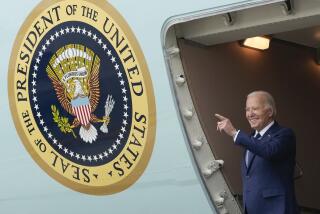Will this third party really mean an elite takeover?
If America ever had a real Establishment, it crumbled under the weight of Vietnam, Watergate and the cultural revolts and counter-revolts of the 1960s and 1970s.
But Americans Elect, which this week qualified as California’s seventh recognized political party and hopes to be certified in all 50 states, looks very much like the work of an elite that aims at nothing less than a new Establishment.
Even by its own claims, AE is the strangest of oxymoronic animals, a nonpartisan, nonpolitical political party-cum-social welfare organization whose only declared objective is a national online “convention” open to all registered voters to select a nonpartisan — or better, maybe, a bipartisan — presidential ticket in 2012.
Poll: Who else would you like to see on the 2012 presidential ballot?
Its declared hope, said Darry Sragow, a veteran California Democratic consultant who is its unofficial political strategist, is to create a route for the millions of voters desperately looking for an alternative to the nation’s broken political process. AE will not campaign for or finance its candidates; its prime objective will be to create and maintain the electronic “highway” by which citizens pick them.
Because AE lists itself as a nonprofit 501(c)4 social welfare organization under the tax laws, similar to the AARP or NAACP, it doesn’t have to disclose its deep-pocket funders, and because its self-perpetuating board of directors, through an Ejection Committee, has reserved to itself the right to veto any AE candidate it doesn’t regard as presidential material, the group has generated a flurry of suspicion — particularly on the left — that, as a writer on Daily Kos put it, it’s an “emerging oligarchy.”
But given the history of third-parties in America, AE could as easily become yet another piece of political roadkill, a monument to well-intentioned naivete.
Alternatively, it could turn into the spoiler of 2012, as Ralph Nader’s campaign in 2000 most likely snatched victory from Al Gore in Florida and delivered the presidency to George W. Bush, and as Theodore Roosevelt’s third-party Bull Moose ticket delivered the presidency to Woodrow Wilson a century ago. Ironically, it could split the centrist vote and hand the White House to the more rabid, extremist candidate.
But it’s equally plausible that AE’s “noblesse oblige” founders can enlist enough frustrated Americans to restore civility and restraint to the nation’s fractious partisanship.
As the AE program is structured, in the (likely) event that its ticket doesn’t win, it will have a postelection Internet convention in order to decide which of the other candidates its electors, if any, will support. Most states have winner-take-all rules under which third parties rarely get electors. But in a very close election, even if AE only won, say, Wyoming or Vermont, which each have three electoral votes, it could make the outcome a real crapshoot.
Among AE’s directors is financier Peter Ackerman, once a colleague of junk bond king Michael Milken at Drexel Burnham Lambert who is the only named funder of the organization and serves as board chairman. According to Sragow, Ackerman has contributed $5 million to what the group says will be a $30-million treasury.
Other directors: former National Intelligence Director Dennis Blair; Irvine O. Hockaday Jr., president and CEO of Hallmark Cards; and former New Jersey Gov. Christine Todd Whitman.
Many of AE’s named “leadership” are academics, business executives or former diplomats. Many, like Whitman and former George W. Bush advisor Mark McKinnon, are disaffected by the conventional political process, and many are linked to Ackerman through his International Center on Nonviolent Conflict in Washington or the half-dozen other international affairs groups that he’s affiliated with, among them the Council on Foreign Relations.
It was the council that journalist Richard Rovere, in a now classic (and semi-facetious) 1961 article, identified as the very heart of the American Establishment, most of them people we would now regard as the rarest of species: moderate Republicans. The three members of the AE Ejection Committee, including former FBI and CIA Director William Webster, are all council members.
Given our nasty, divisive politics, there is in fact a good argument to be made for some sort of centrist, moderating establishment that could check the centrifugal forces in our politics.
Though never explicit, the idea seems to underlie the creation of No Labels, a group trying to reform congressional politics; the California Think Long Committee, funded by billionaire Nicolas Berggruen; and the various other calls for a more centrist politics.
The Long Thinkers, among them two former Republican U.S. secretaries of State and two former Democratic Assembly speakers, call for an appointed 13-member super committee (presumably people like themselves) with the power to put measures on the ballot without getting voter signatures first, and to hold hearings and issue subpoenas, and be accountable to no one.
Those proposals, like AE’s, are all set in language about restoring democracy and the power of the people. But it’s an elite that wants to manage it. Have things become desperate enough in our politics that we need an establishment to restore our manners?
Peter Schrag, former editorial page editor of the Sacramento Bee, is the author most recently of “Not Fit for Our Society: Immigration and Nativism in America.”
More to Read
A cure for the common opinion
Get thought-provoking perspectives with our weekly newsletter.
You may occasionally receive promotional content from the Los Angeles Times.










